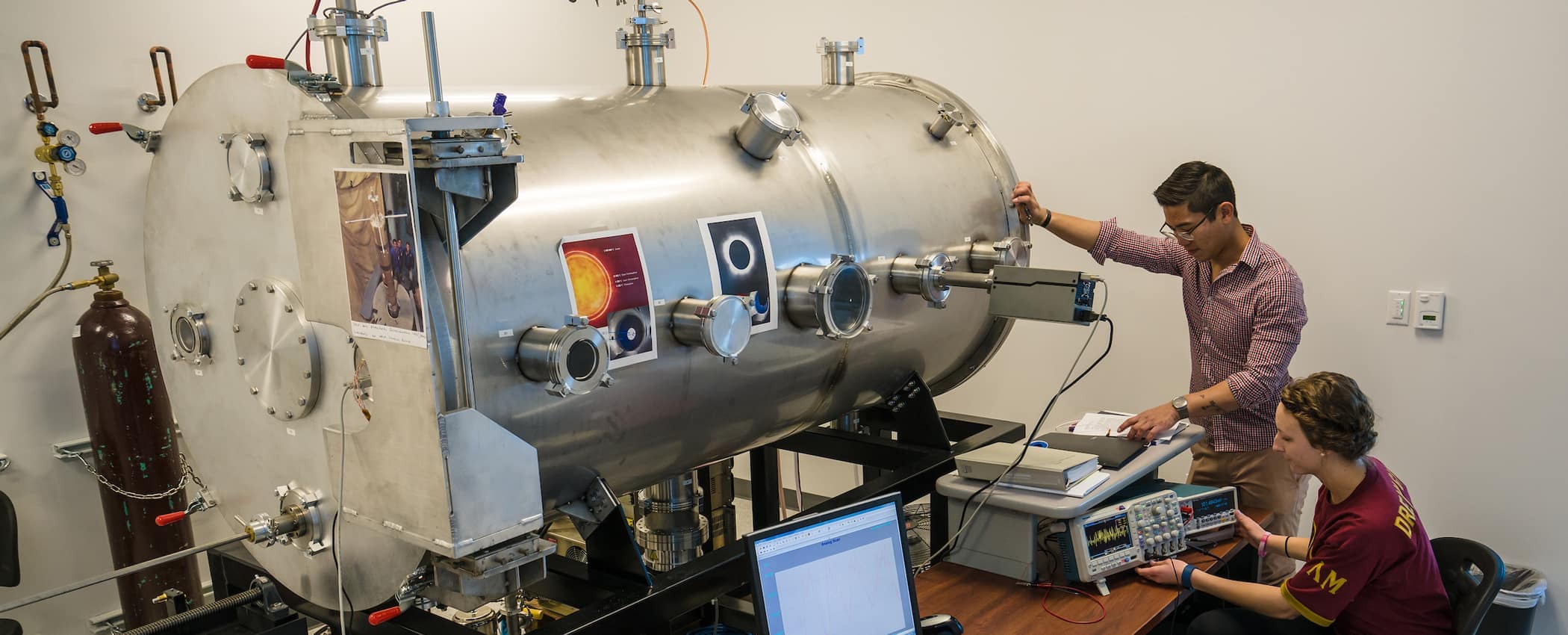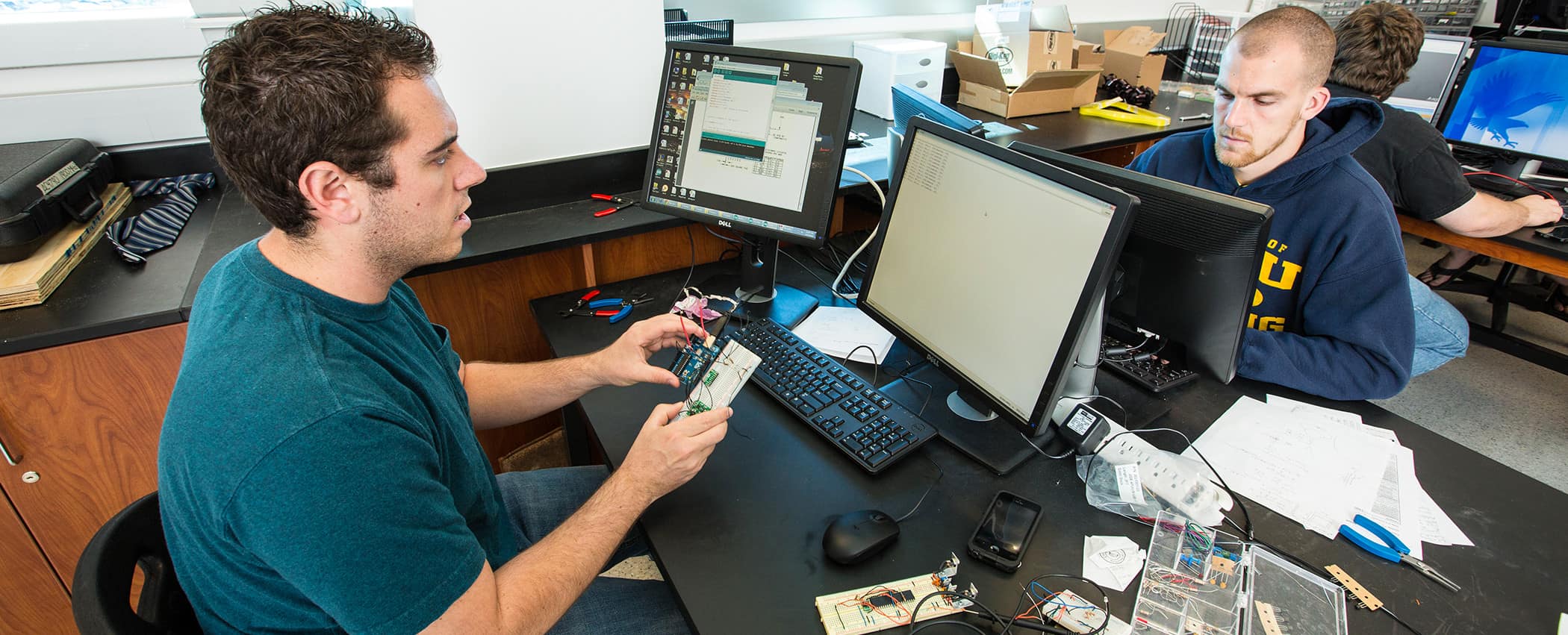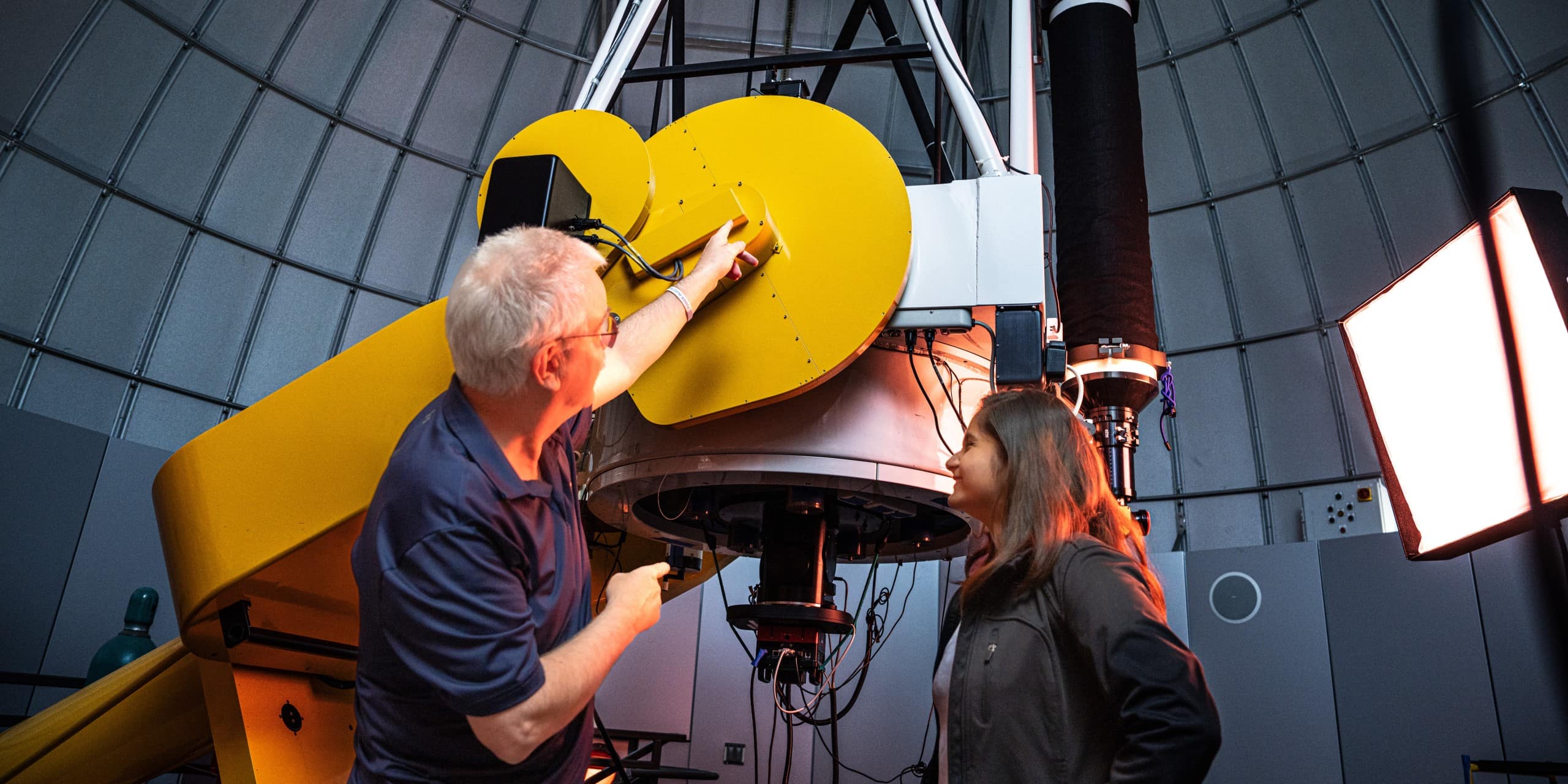
Bachelor of Science in
Astronomy
The B.S. in Astronomy allows you to explore the universe through hands-on experiences while engaging in exciting research projects.
About the Bachelor of Science in Astronomy
Because you can't bring celestial objects like planets or stars into a lab, astronomy is a distinct and unique scientific field. You combine observations, physics principles, computer analysis and critical thinking to explore these distant entities. At Embry-Riddle Aeronautical University, you can pursue a Bachelor of Science in Astronomy that combines physics and astronomy classes with hands-on lab experiences. This program prepares you for various careers in science or graduate studies.
Embry-Riddle offers unique advantages, including faculty connections to resources like the James Webb Space Telescope and the Chandra X-ray Observatory. Our own astronomical resources and facilities can be found directly on campus, such as the Prescott Campus Observatory. You'll also have opportunities to work closely with faculty on research projects funded by astronomy leaders, including NASA and the National Science Foundation.
Astronomy Career Opportunities
Careers and Employers
Embry-Riddle graduates are prepared to enter the industry as data analysts, scientists and optical engineers or continue to further education in graduate school to pursue research careers.
Students earning a degree in Astronomy often accept employment offers from top companies such as NASA, Naval Sea Systems Command, MIT-Haystack Observatory and the Harvard-Smithsonian Astrophysical Observatory.
Astronomy Salary Information
Receiving a degree in Astronomy from Embry-Riddle provides the opportunity for competitive salaries, averaging $149,530 annually as of 2023.
DETAILS
About Astronomy at the Prescott, AZ Campus
At the Prescott Campus, you’ll engage in hands-on experiences with instruments that unveil the secrets of the skies. In the Bachelor of Science in Astronomy, you can observe celestial objects using the 20-inch and 16-inch optical telescopes at the Prescott Observatory Complex.
You’ll collaborate on undergraduate research with faculty involved in projects funded by NASA, the National Science Foundation and others. Our faculty often work analyzing data from advanced facilities like the James Webb Space Telescope and X-Ray satellites, including those used in the X-Ray Imaging and Spectroscopy Mission (XRISM).
Astronomy Information
- Credits: 120
- Online or In-Person: In-Person
- Thesis: Research Thesis (6 credits)
Helpful Links
- Tour our Prescott Campus
- Discover the Faculty'sDepartment
- Explore the Fields of Study: Space
- Find Related Clubs & Organizations
Student Learning Outcomes
Students will:
- Develop an informed, professional understanding of the current state of knowledge of the astronomical and physical Universe.
- Properly operate astronomical telescopes and detectors to obtain scientific data on astronomical objects.
- Apply prevailing models in astronomy to real systems using current techniques.
- Communicate astronomical results to astronomers and non-astronomers, including giving talks, writing technical reports, and writing papers for publication.
Degree Requirements
The Bachelor of Science in Astronomy is a 120 credit hour program that can be completed in eight semesters. The list of courses below comprises the complete requirements for the degree of Bachelor of Science in Astronomy. Before registering for a course, check the course descriptions to ensure that all prerequisites and/or corequisites are met. To best ensure success in a course, it is recommended that students earn a C grade or better in all prerequisite courses. Students must have a minimum cumulative GPA of 2.0 in core PS courses.
Students may not pursue both an Astronomy B.S. degree and a Space Physics B.S. degree. However, also note that the degree requirements for the first three semesters of both degree programs can be satisfied with the same courses. Thus, a student who is making appropriate progress in either the Astronomy or Space Physics degree programs can switch to the other program after the third semester with a complete transfer of credit from one program to the other.
Program Requirements
General Education
Embry-Riddle degree programs require students to complete a minimum of 36 hours of General Education coursework. For a full description of Embry-Riddle General Education guidelines, please see the General Education section of this catalog.
Students may choose other classes outside of their requirements, but doing so can result in the student having to complete more than the degree's 120 credit hours. This will result in additional time and cost to the student.
| Communication Theory and Skills | 9 | |
| Computer Science/Information Technology | 3 | |
| Mathematics | 6 | |
| Physical and Life Sciences (Natural Sciences) | 6 | |
| Humanities and Social Sciences | 12 | |
3 hours of Lower-Level Humanities | ||
3 hours of Lower-Level Social Science | ||
3 hours of Lower-Level or Upper-Level Humanities or Social Science | ||
3 hours of Upper-Level Humanities or Social Science | ||
| Total Credits | 36 | |
Astronomy Core (99 Credits)
The following course of study outlines the quickest and most cost-efficient route for students to earn their B.S. in Astronomy. Students are encouraged to follow the course of study to ensure they complete all program required courses and their prerequisites within four years.
Courses in the core with a # will satisfy your general education requirements.
| CHM 110 & 110L | General Chemistry I and General Chemistry I Laboratory # | 4 |
| CS 118 | Fundamentals of Computer Programming # | 3 |
| or EGR 115 | Introduction to Computing for Engineers | |
| General Education - Communication Electives # | 9 | |
| General Education - Humanities Lower-Level Elective # | 3 | |
| General Education - Humanities Upper-Level Elective # | 3 | |
| General Education - Social Science Lower-Level Elective # | 3 | |
| General Education - Social Sciences Upper-Level Elective # | 3 | |
| MA 241 | Calculus and Analytical Geometry I # | 4 |
| MA 242 | Calculus and Analytical Geometry II # | 4 |
| MA 243 | Calculus and Analytical Geometry III | 4 |
| MA 335 | Introduction to Linear and Abstract Algebra | 3 |
| MA 345 | Differential Equations and Matrix Methods | 4 |
| MA 441 | Mathematical Methods for Engineering and Physics I | 3 |
| PS 180 | Introductory Astronomy Laboratory | 1 |
| PS 204 | General Astronomy | 3 |
| PS 215 | Physics I # | 3 |
| PS 216 | Physics I Laboratory | 1 |
| PS 208 | Physics II | 3 |
| PS 219 | Physics III | 3 |
| PS 221 | Intermediate Physics Laboratory | 2 |
| PS 222 | Intermediate Astronomy | 3 |
| PS 232 | Computational Methods in the Physical Sciences | 3 |
| PS 303 | Modern Physics | 3 |
| PS 315 | Modern Physics Laboratory | 2 |
| PS 321 | Classical Mechanics I | 3 |
| PS 330 | Electricity and Magnetism I | 3 |
| PS 332 | Techniques of Observational Astronomy | 3 |
| PS 340 | Astrophysics I | 3 |
| PS 350 | Quantum Mechanics I | 3 |
| PS 380 | Optics Laboratory | 3 |
| PS 408 | Astrophysics II | 3 |
| UNIV 101 | College Success | 1 |
Research Thesis (6 credits)
| PS 490 | Senior Research Thesis, Part I | 3 |
| PS 491 | Senior Research Thesis, Part II | 3 |
Technical Electives (9 credits)
Choose a total of 3 courses from the list of courses below:
| MA 412 | Probability and Statistics | 3 |
| MA 442 | Mathematical Methods for Engineering and Physics II | 3 |
| MA 443 | Complex Variables | 3 |
| PS 322 | Classical Mechanics II | 3 |
| PS 331 | Electricity and Magnetism II | 3 |
| PS 341 | High Energy Astrophysics | 3 |
| PS 405 | Atomic Nuclear Physics | 3 |
| PS 412 | Particle Physics and Cosmology | 3 |
| PS 413 | Particle Physics and Cosmology II | 3 |
| PS 422 | Space Propulsion | 3 |
| PS 435 | Solid State Theory | 3 |
Technical electives include MA or PS Directed Study courses that may be approved by the Department Chair.
Open Elective (6 Credits)
| Open Electives | 6 | |
| Total Credits | 120 | |
- #
General Education Courses
All Army ROTC students are required to complete SS 321 - U.S. Military History 1900-Present (3 credits) in order to commission.
Suggested Plan of Study
| Freshman Year | ||
|---|---|---|
| Fall | Credits | |
| Communication Elective Lower-Level | 3 | |
| CS 118 | Fundamentals of Computer Programming | 3 |
or EGR 115
|
Introduction to Computing for Engineers | |
| MA 241 | Calculus and Analytical Geometry I | 4 |
| PS 215 | Physics I | 3 |
| PS 216 | Physics I Laboratory | 1 |
| UNIV 101 | College Success | 1 |
| PS 180 | Introductory Astronomy Laboratory | 1 |
| Credits Subtotal | 16.0 | |
| Spring | ||
| CHM 110 & 110L |
General Chemistry I | 4 |
| MA 242 | Calculus and Analytical Geometry II | 4 |
| PS 204 | General Astronomy | 3 |
| PS 208 | Physics II | 3 |
| PS 221 | Intermediate Physics Laboratory | 2 |
| Credits Subtotal | 16.0 | |
| Sophomore Year | ||
| Fall | ||
| Humanities Lower-Level Elective | 3 | |
| MA 243 | Calculus and Analytical Geometry III | 4 |
| PS 219 | Physics III | 3 |
| PS 222 | Intermediate Astronomy | 3 |
| PS 232 | Computational Methods in the Physical Sciences | 3 |
| Credits Subtotal | 16.0 | |
| Spring | ||
| MA 335 | Introduction to Linear and Abstract Algebra | 3 |
| MA 345 | Differential Equations and Matrix Methods | 4 |
| PS 303 | Modern Physics | 3 |
| PS 315 | Modern Physics Laboratory | 2 |
| PS 332 | Techniques of Observational Astronomy | 3 |
| Credits Subtotal | 15.0 | |
| Junior Year | ||
| Fall | ||
| Communication Lower-Level Elective | 3 | |
| MA 441 | Mathematical Methods for Engineering and Physics I | 3 |
| Open Electives | 3 | |
| PS 330 | Electricity and Magnetism I | 3 |
| PS 340 | Astrophysics I | 3 |
| Credits Subtotal | 15.0 | |
| Spring | ||
| PS 350 | Quantum Mechanics I | 3 |
| Communication Lower-Level Elective | 3 | |
| Social Science Lower-Level Elective | 3 | |
| Technical Elective | 6 | |
| Credits Subtotal | 15.0 | |
| Senior Year | ||
| Fall | ||
| Humanities Upper-Level Elective | 3 | |
| PS 321 | Classical Mechanics I | 3 |
| PS 408 | Astrophysics II | 3 |
| PS 490 | Senior Research Thesis, Part I | 3 |
| Social Science Upper-Level Elective | 3 | |
| Credits Subtotal | 15.0 | |
| Spring | ||
| Open Electives | 3 | |
| PS 380 | Optics Laboratory | 3 |
| PS 491 | Senior Research Thesis, Part II | 3 |
| Technical Elective | 3 | |
| Credits Subtotal | 12.0 | |
| Credits Total: | 120.0 | |
Get Started Now:
Summary
120 Credits
Estimate your tuition by using the Tuition Calculator
View Financial Aid Information
Learn about our General Education
Find out about transferring credits to this degree
Learn more about our Veterans & Military benefits
View our Academic Calendar




